Results 1 to 10 of 10
 20Likes
20Likes
Thread: Rayson Warranted
-
03-21-2013, 11:31 PM #1
 Rayson Warranted
Rayson Warranted
Hi all, I posted about this razor in a lot a couple days ago but it really deserves its own post. I got some decent light today and so was able to take some better pictures. I know almost nothing about this razor and would love to know more. It's English, but I'm not sure whether it is from Sheffield, and I'm not sure if it read (B)ayson or (R)ayson. I'm assuming it dates to around the 1790s-1800. I turned up the name Benjamin Rayson in the Hallamshire book but not much more. In any case, it is quite a work of craft.
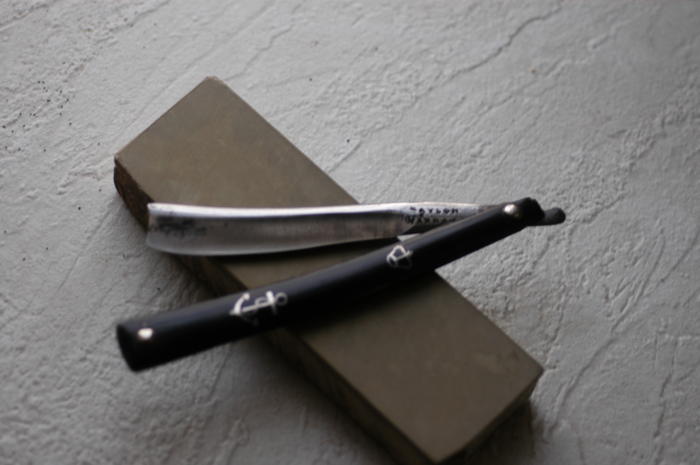
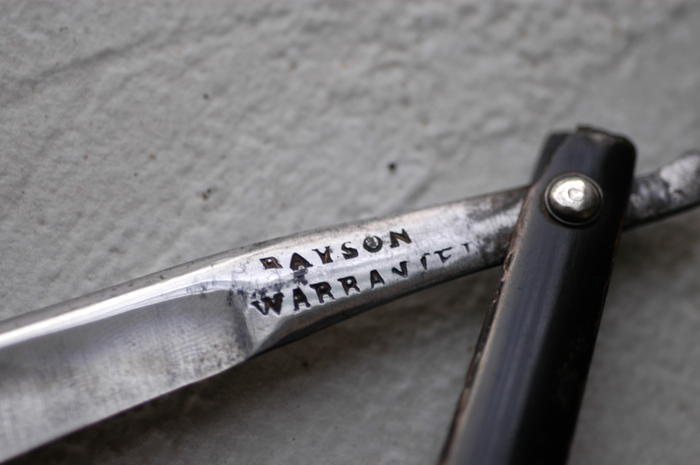
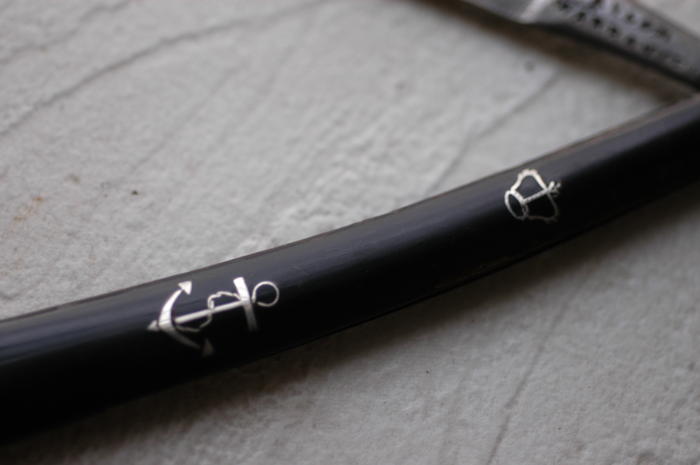
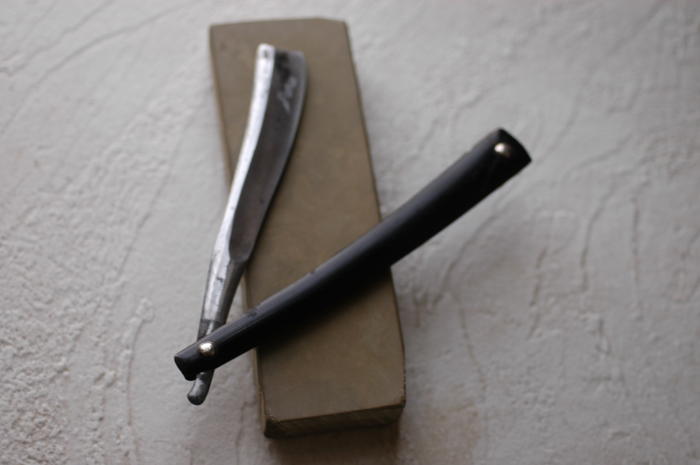
-
03-21-2013, 11:40 PM #2

Lovely. Because the scales have the slight curve, assuming Robert Doyle's "Collecting Straight Razors" is correct, it would be very early 1800s. Gets my RAD boiling to see these stub tails posted. I've always loved 'em.
-
03-22-2013, 12:01 AM #3

The scales are slightly curved but the blade shape looked a little earlier to me. It probably is later, but with the earlier stuff there turn out to be a lot of exceptions to the 'rules' (though this is mostly with fancier razors, this may be closer to a 'working mans' razor if there were such a thing). There's a number of razors c. 1760-1800 with quite curved scales and post-1800 razors with dead straight scales, so I'm always a little wary, but in general it holds.
-
03-22-2013, 02:48 AM #4

My price book mentions "Rayson & Co., England" but doesn't have any more info. That is a seriously beautiful razor, thanks for sharing

-
03-22-2013, 02:52 AM #5
-
03-22-2013, 02:58 AM #6Just a guy with free time.

- Join Date
- Oct 2011
- Location
- Mid state Illinois
- Posts
- 1,448
Thanked: 247
That's a really beautiful piece. I'm glad you put it in it's own thread, because I didn't see the other thread. No chance it says Hawson? I know it looks like a closed loop at the top of what would be the H, but we're talking about a different time, and possibly carved by hand stampings, over multiple usages. Just a thought.
 You seem to know more about these oldies than I do, and certainly more about how to spot them on the bay...grrr.. Anyways, let me know if you think that's even a possibility. Again, thanks for posting. Actually, I did find a couple pages for a Rawson Bros. Sheffield. Might look into that too yeah?
You seem to know more about these oldies than I do, and certainly more about how to spot them on the bay...grrr.. Anyways, let me know if you think that's even a possibility. Again, thanks for posting. Actually, I did find a couple pages for a Rawson Bros. Sheffield. Might look into that too yeah?
http://books.google.com/books?id=3Ac...cutler&f=false
Looks like there were Rawson Cutlers as far back as 1712.Last edited by regularjoe; 03-22-2013 at 03:10 AM.
-
03-22-2013, 03:42 AM #7

What's in the picture is about as clear as I can make it out. Don't think the first letter can be an H, and don't think it's Rawson either. I checked around for Ranson and Ravson as well but didn't turn up anything. Still a mystery...
-
The Following User Says Thank You to ScienceGuy For This Useful Post:
regularjoe (03-22-2013)
-
03-22-2013, 03:48 AM #8

Benjamin may well have had some sons who also went into the business. There's an Edward and a William Rayson, both of whom listed their professions as razorsmith.
Mind, I'm only finding traces of them through the baptism records of their children. They were procreating, if not making razors, in the 1820-1830 range. I think Benjamin most likely made your razor.
I notice that Benjamin was apprenticed to Joseph Creswicke and his uncle paid the rather large sum of £20 for the privilege.
His uncle was William Hall, who I thought might possibly have been the Hall of Clark & Hall, but nope. Different guy.
It's important to take Doyle's morphological dating with a pinch of salt. With the unusual design of this razor, I'd say that any time between 1790 and 1820 are fair game, but my guess is to more toward the 18th century than the 19th.-Zak Jarvis. Writer. Artist. Bon vivant.
-
The Following 2 Users Say Thank You to Voidmonster For This Useful Post:
regularjoe (03-22-2013), ScienceGuy (03-22-2013)
-
03-22-2013, 06:03 AM #9

just had to post it again !!!!!! im still cleaning drewl off the keyboard from last time !!!!!!!
-
03-23-2013, 06:23 PM #10

Got some actual light today and took a photo with this one together with the (H)arwood warranted I have. I think they are right around the same time period - they have the same collars, the distance between the collars is the same, the shape of the scales has the same curvature, and the blade shape is very similar.
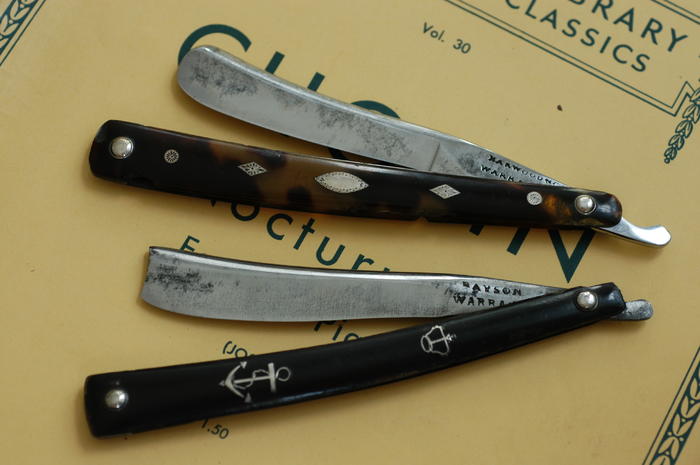
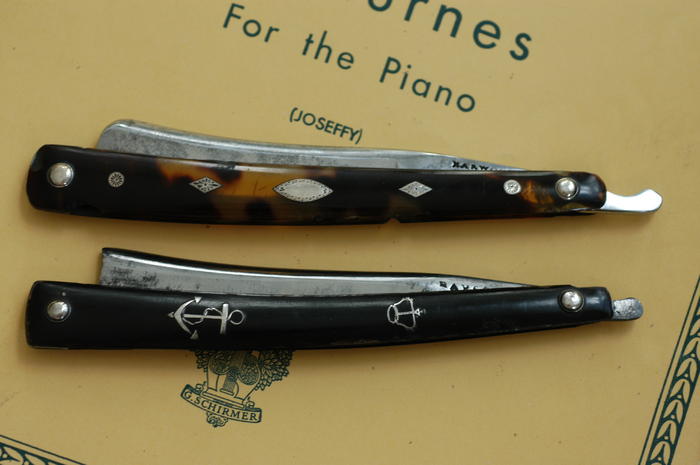
-
The Following User Says Thank You to ScienceGuy For This Useful Post:
regularjoe (03-23-2013)


 LinkBack URL
LinkBack URL About LinkBacks
About LinkBacks







 Reply With Quote
Reply With Quote


